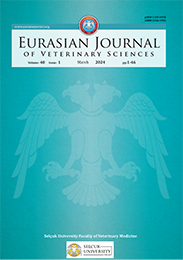| 2019, Cilt 35, Sayı 3, Sayfa(lar) 165-169 | |
| [ Özet ] [ PDF ] [ Benzer Makaleler ] [ Yazara E-Posta ] [ Editöre E-Posta ] | |
| Detection of Leishmania infantum seropositivity in dogs by ELISA technique in Thrace region of Turkey | |
| Sezai Arslan1, Taraneh Öncel2, Kudret Yenilmez3, Nesrin Turan4 | |
| ¹Tekirdağ Namık Kemal Üniversitesi, Veteriner Fakültesi, İç Hastalıkları Anabilim Dalı, Tekirdağ, Türkiye 2Pendik Veteriner Kontrol Enstitüsü, Paraziter Teşhis Laboratuvarı, İstanbul, Türkiye 3Tekirdağ Namık Kemal Üniversitesi, Veteriner Fakültesi, Doğum ve Jinekoloji Anabilim Dalı, Tekirdağ, Türkiye 4Pendik Veteriner Kontrol Enstitüsü, Serolojik Teşhis Laboratuvarı, İstanbul, Türkiye |
|
| Keywords: Leishmania infantum, Dog, ELISA, Thrace Region, Turkey | |
| Abstract | |
Aim: The aim of this study was to investigate the presence
of anti-Leishmania infantum (L. infantum) antibodies in stray
dogs in some temporary animal shelters in Thrace region of
Turkey. Materials and Methods: Material of study included a total of 184 dogs in the Thrace region. (Çanakkale/Gelibolu, Edirne/ Uzunköprü, Kırklareli/Center, İstanbul/Silivri and Tekirdağ/ Süleymanpaşa. Detection of antibodies to L. infantum was performed by Enzyme-Linked Immuno-Sorbent Assay (ELISA) technique. Results: Of the 184 dog serum samples examined for anti-L. infantum antibodies, 16 were seropositive (8,7%) and 168 (91,3%) were seronegative. While there was no positivity in Çanakkale/Gelibolu and Kırklareli/Center, 13,9%, 12,1% and 4% of the examined dogs were found seropositive in İstanbul/ Silivri, Edirne/Uzunköprü and Tekirdağ/Süleymanpaşa, respectively. It was found that seropositivity rate was not related to sex and the rate of seropositivity was increased in dogs older than 4 years in this study. Conclusion: It was concluded that Leishmaniasis is an important zoonotic disease for human and dog health and it would be appropriate to investigate vector Phelebotomus species in the Thrace region. |
|
| [ Başa Dön ] [ Özet ] [ PDF ] [ Benzer Makaleler ] [ Yazara E-Posta ] [ Editöre E-Posta ] | |




